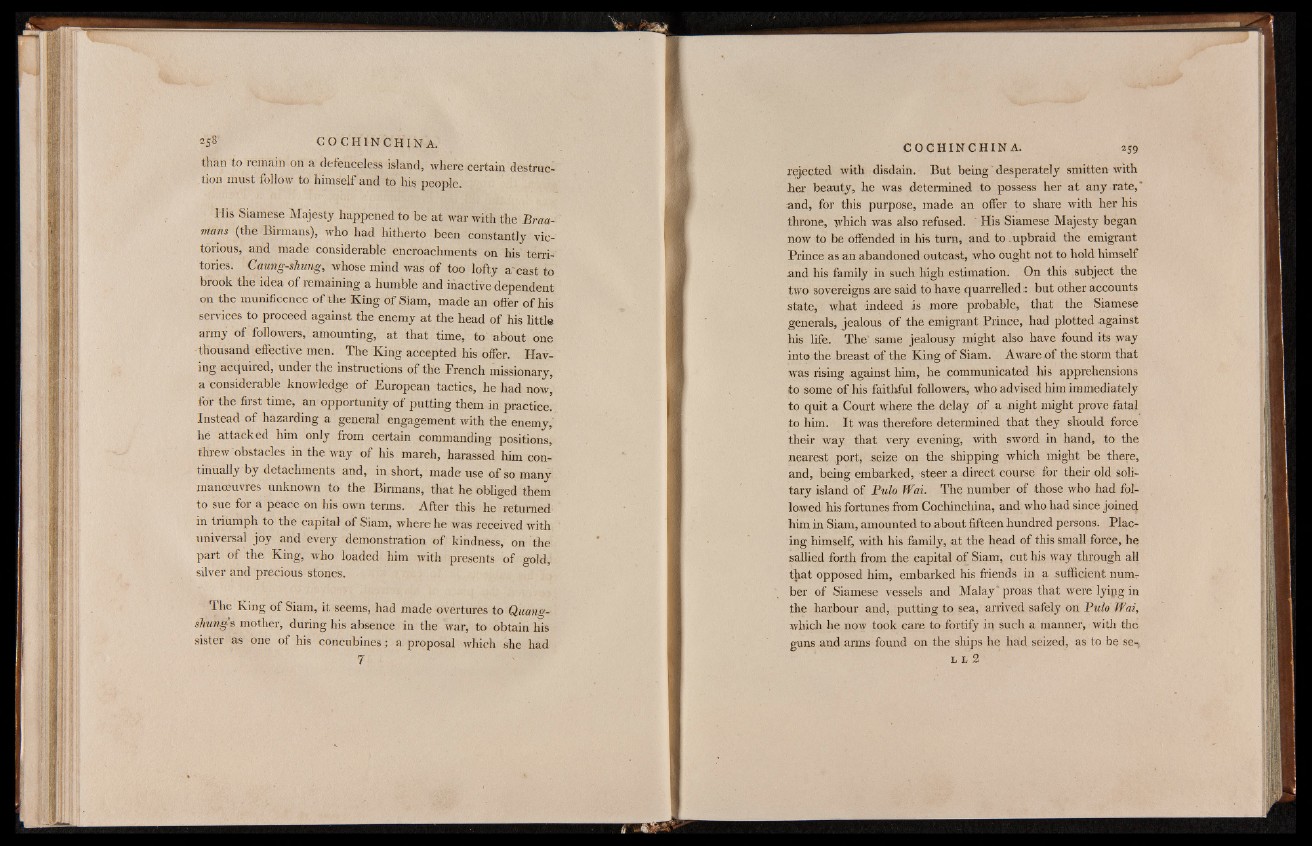
than to remain on a defenceless island, where certain destruction
must follow to himself and to his people.
llis Siamese Majesty happened to be at war with the Braa-
mans (the Birmans), who had hitherto been constantly victorious,
and made considerable encroachments on his territories.
Caung-shiing, whose mind was of too lofty a'cast to
brook the idea of remaining a humble and inactive dependent
on the munificence of the King of Siam, made an offer of his
services to proceed against the enemy at the head of his little
army of followers, amounting, at that time, to about one
thousand effective men. The King accepted his offer. Hav-
mg acquired, under the instructions of the Trench missionary,
a considerable knowledge of European tactics, he had now,
foi the fiist time, an opportunity of putting them in practice.
Instead of hazarding a general engagement with the enemy,
he attacked him only from certain commanding positions,
threw obstacles in the way of his march, harassed him continually
by detachments and, in short, made use of so many
manoeuvres unknown to the Birmans, that he obliged them
to sue for a peace on his own terms. After this he returned
in triumph to the capital of Siam, where he was received with
universal joy and every demonstration of kindness, on the
part of the King, who loaded him with presents of gold,
silver and precious stones.
The King of Siam, it seems, had made overtures to Quang-
shungs mother, during his absence in the war, to obtain his
sister as one of his concubines ; a. proposal which she had
7
rejected with disdain. But being ’ desperately smitten with
her beauty, he was determined to possess her at any rate,-
and, for this purpose, made an offer to share with her his
throne, which was also refused. ' His Siamese Majesty began
now to be offended in his turn, and to upbraid the emigrant
Prince as an abandoned outcast, who ought not to hold himself
and his family in such high estimation. On this subject the
two sovereigns are said to have q u a rre lle d b u t other accounts
state, what indeed is more probable, that the Siamese
generals, jealous of the emigrant Prince, had plotted against
his life. The' same jealousy might also have found its way
into the breast of the King of Siam. Aware of the storm that
was rising against him, he communicated his apprehensions
to some of his faithful followers, who advised him immediately
to quit a Court where the delay of a night might prove fatal
to him. I t was therefore determined that they should force
their way that very evening, with sword in hand, to the
nearest port, seize on the shipping which might be there,
and, being embarked, steer a direct course for their old solitary
island of Pulo Wai. The number of those who had followed
his fortunes from Cochinchina, and who had since joined
him in Siam, amounted to about fifteen hundred persons. Placing
himself) with his family, a t the head of this small force, he
sallied forth from the capital of Siam, cut his way through all
that opposed him, embarked his friends in a sufficient number
of Siamese vessels and Malay“ proas that were lyipg in
the harbour and, putting to sea, arrived safely on Pulo Wai,
which he now took care to fortify in such a manner, with the
guns and arms found on the ships he had seized, as to be se-.
l l 2